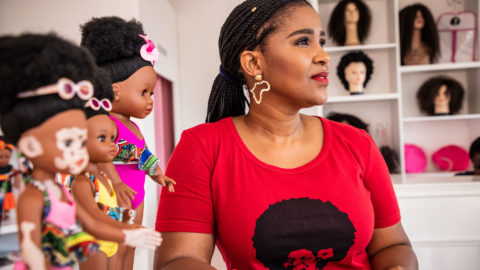Is the company of your dreams really the perfect match?
A recruiter offers strategies that can help you decide if a workplace is a good cultural fit for you
Building your career is a journey filled with challenges, excitement, and forks in the road. And journeys are easier with maps. In this column, job experts answer your questions and deliver advice to help you take the next step.
Question: I’m looking for a new job, but it’s tough to tell from the outside if the companies I’m considering have the culture that I’m looking for. How can I figure that out before I get there?
Answer: As job seekers, we often focus on finding the “perfect role.” But what about the company itself—how does its culture align with what you value and are motivated by?
Zara Mulholland, a Microsoft recruiter based in Dublin, suggests that you consider a few things before you start your job search.
“You should have a strong idea of your own values, personality, and working style,” she said. Job seekers should consider “how they like to work and if the company aligns with that. Company culture is the personality of a company. It defines the environment in which you will work, and it is an emotive topic.
“As you research a company’s culture, remember to look for a variety of elements, including work environment, company mission, value, ethics, expectations, and goals,” said Mulholland.
Make a checklist
Sometimes it helps to write a checklist of what’s important to you.
Do you enjoy managing your own time and projects, or do you prefer hands-on support? Perhaps you need a company that will help you grow and that will support your overall career aspirations. Mulholland encourages job seekers to think about all the areas that are a part of their professional DNA.
Beyond your work style and needs, who are you? What matters to you? Do you like to help others? Consider the company’s philanthropic efforts, its stance on volunteerism, and how it supports employee volunteer efforts. Are you on the same page?
“Think about what you like to do, and find a company that will give you the platform to do it,” Mulholland advised.
A checklist can help you track what’s most important to you and, eventually, compare different potential paths.
Identify the values of the company
Now that you know what matters to you on the job, find out what the companies you’re considering are made of. Long gone are the days of relying solely on a company’s About Us page. The good news? The internet is brimming with comprehensive information, so make good use of it.
Mulholland said that the About Us page is still a good place to start when you want to learn a company’s mission statement and its values.
“You can also use the company’s social media channels to give you insights into their culture, stories about current employee successes, how they give back to communities, and what the company’s offices are like,” she said.
Look at company posts for insight, then go a step further and follow company hashtags (e.g., #MicrosoftLife) on applicable platforms to join the conversation. Often, you’ll find employees sharing personal experiences, which can help you get the inside scoop.
Be sure to check out comments under posts as well. They can help you see how others view and are engaging with the company and its employees and fans.
Another avenue is to search for the latest company news. Set an alert on your phone. Follow the company on LinkedIn. Check out the newsroom pages of the company’s site. This will allow you to stay on top of what the company is doing and how the world is responding and help you become deeply familiar with the company’s values.
At the end of the day, as you do your research, your goal is to understand if the company is walking the walk and not simply talking the talk. If a company lists “saving the planet” as a value, but you are hard pressed to find actual examples of it doing just that, take note. If you proceed, you can dig into this area later in your process, perhaps during your interview.
Gather firsthand intel
While we can’t deny the power of internet research, your best source of information is actual employees.
“To really understand what the company’s culture is like and whether it fits what you’re looking for, speak with people you know who work there,” said Mulholland. “Everyone’s experience is different and individual. What suits one person won’t suit another. You can gain insight into what it is like to work there day-to-day, what the person enjoys and doesn’t enjoy about the company.
“You could also ask if there are any external resources they can share with you, such as links to day-to-day insights,” she added.
But, like many, you might not know someone who’s “on the inside.” Mulholland advises you to tap into your LinkedIn connections. “LinkedIn is a super resource to see who you know that could introduce you to someone who works at the company or who is currently hiring for a team within the company,” she said.
Mulholland is a supporter of “exploratory conversations,” which allow you to talk with someone closely familiar with a team or role you’re interested in. “Think about your connections in terms of the area of business that you want to work in and getting an introduction to someone who works in that part of the business,” she said.
Learn more during the interview
So, the company passed your deep-dive research, you’ve applied, and now you’re set up for your first interview. Congratulations!
Your search for the perfect match doesn’t stop there. “If you are on site for the interview, you can use the opportunity to see the offices and whether the environment is what you expected,” said Mulholland.
During the interview, your interviewer is likely to give you a chance to ask questions. This is your moment, so prepare a list of questions and take the opportunity to get answers. If your checklist surfaced any concerns, this is the time to ask about them.
Of course, be respectful of the allotted time. Prioritize your list of questions in order of importance in case you don’t have time to ask them all. But, don’t forget: you want to make a good impression, so be sure to include thoughtful questions about your role.
Assess your findings
Now that you have all the information in front of you, you should determine if the company is a perfect match.
If the culture doesn’t feel right, Mulholland wants candidates to think about why. Is there one tenet in the company’s values that isn’t adding up, such as the work environment or expectations of employees?
“Ask yourself ‘is this something that I can work with, or do I fundamentally feel that the company isn’t the right place for me?’” Mulholland added. “If the culture isn’t something that you feel you will enjoy or will set you up for success, is it really the perfect place to work?”
Mulholland reminds candidates that every person’s personality and every company’s culture is different, so don’t expect to find a 100 percent alignment with every company you consider. Seek a company that is as close of a match to what matters to you as possible.
And remember, you can influence your company, too. A company’s culture is constantly evolving, driven in large part by its employees. Often, there’s opportunity to drive change in the areas that are lacking. Companies are more inclusive and better because employees push them to be better.
Finally, keep the big picture in mind.
“Consider a company whose culture is inclusive, supports diversity of opinion and thought, and will support your career goals,” Mulholland said. “Find a company whose culture allows you to thrive and that you feel good to work for.”



















